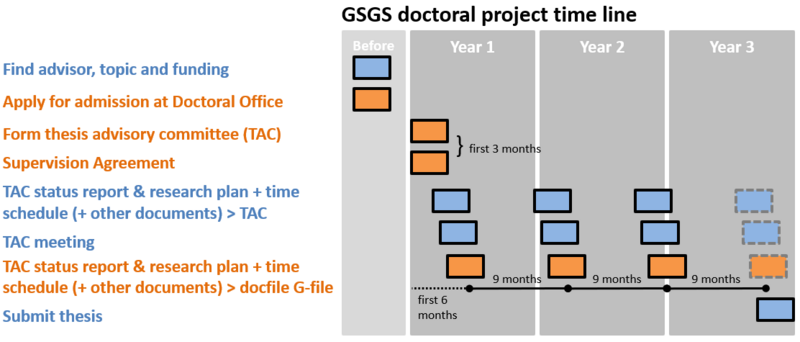Structured Guidance
The above chart (Fig. 1) outlines how structured guidance is organised within the GSGS. More detailed information can be found in the Supervision Agreement.
The Admission section gives information on what to do to become a GSGS member.
As a GSGS member you should
- Form a thesis advisory committee (TAC);
- Sign a supervision agreement with the members of your TAC;
- Report regularly to your TAC and the GSGS office;
- Meet frequently with your TAC members.
Thesis Advisory Committee (TAC)
Note 1: TAC members are not necessarily the people who will serve on the examination board for the thesis defence.
TAC Meeting Goals
The Thesis Advisory Committee (from here on referred to as TAC) is responsible for the individual scientific guidance of doctoral candidates in addition to their (official) advisor (see Glossary on the right for different roles). The official advisor can be a TAC member. The main purpose of TAC meetings is to keep track of and discuss the scientific progress, and to offer advice on the thesis project’s development. At least one mentor is not part of the (official) advisor’s research group and thus provides an external view of the project and an independent opinion. If necessary, this independent mentor can mediate between the doctoral candidate and the (official) advisor. In cases of serious conflict, the TAC can hand over to dedicated ombudspersons. Additionally, the TAC should advise doctoral candidates on career planning and professional development.
TAC composition
- The TAC consists of the advisor and, if applicable the official advisor, at least one mentor and the doctoral candidate.
- At least one mentor must come from outside of the research group(s) of both the advisor and the official advisor in order to promote independence. Mentors may come from outside the University of Cologne.
- In their first meeting, the TAC appoint a TAC chairperson. The TAC chairperson moderates the meetings and ensures the documentation of the TAC meetings.
- All TAC members should be present at each TAC meeting (TAC meetings can be conducted using an online conferencing tool).
TAC Topics
- Project progress and timeline:
- The main focus of the TAC should be to provide scientific guidance to the doctoral candidate and offer scope beyond the input from the doctoral candidate’s research group.
- Record of on-the-job training in (experimental) techniques, evaluation methods, theoretical background, literature, network, outlook /research plan /proposal
- Adjustments of research plans /change of topic /unexpected developments
- (First) results
- Finishing up / rounding off the project
- Publication strategy, especially the format of the thesis
- Conference attendance
- Career plans, recommended workshops/ trainings
- Conflict prevention. In addition, the TAC should point out the different contact points at Department, Faculty and University level for complaint management.
Suggested TAC meeting format
- Short presentation by doctoral candidate
- Progress discussion with all TAC members
- Discussion without advisor (mandatory)
- Duration: 1 - 1.5 hours
Supervision Agreement
- The doctoral candidate and his/her/their TAC members agree on and sign a supervision agreement (download to fill out) within the first 3 months of a candidate’s project.
- The doctoral candidate uploads the digitally signed agreement to Docfile, in the graduate program ("G") record.
- The doctoral candidate notifies the GSGS office of the upload via an email to gradschool-geosci
uni-koeln.de
Please consult the Docfile Frequently Asked Questions for help on uploading documents in Docfile.
In principle, the supervision agreement needs to be uploaded before any GSGS training (apart from Induction Part A) can be attended or funding can be applied for.
By mutual agreement of the signatories, most parts of this document can be changed at all times. Inform the GSGS office via the procedure described above of any changes to your supervision agreement.
Reporting, TAC Meetings & Feedback
Please follow this link.
